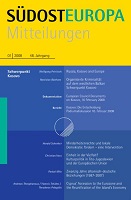Russia, Kosovo and Europe – A Case Study in Post-Cold War Conflict Management
Russia, Kosovo and Europe – A Case Study in Post-Cold War Conflict Management
Author(s): Wolfgang PetritschSubject(s): Politics / Political Sciences
Published by: Südosteuropa Gesellschaft e.V.
Summary/Abstract: Russia’s current involvement in Kosovo and its stern opposition to the independence of the province must increasingly be seen as part of the new race for political influence in Southeast Europe. After more than a decade in which Russia’s role in this region oscillated between non-engagement, Slavic-Orthodox solidarity and cooperation with the West, Russia now takes a new, more assertive stand with clearly defined economic, political and strategic goals. As far as the European Union is concerned it is important to comprehend that Russia’s insistence on Belgrade’s prior consent to any change of the status of Kosovo is not just an expression of the traditional relationship between Russia and Serbia. It also plays into Russia’s rather recent economic engagement in Serbia whose energy sector has come out as a strategic target. The European Union will undoubtedly succeed in this new competitive environment as it can offer Serbia integration into its sphere. Its policies, if applied consistently, could bring an improvement of the current social and economic situation and offer a promise for a better future, thereby ushering in peace, stability, and increased prosperity to the entire war-torn region. Conversely, Moscow’s return to the Balkans is both a challenge and an opportunity for a more meaningful cooperation between the EU, Russia and Southeast Europe.
Journal: Südosteuropa Mitteilungen
- Issue Year: 2008
- Issue No: 01
- Page Range: 6-17
- Page Count: 12
- Language: English
- Content File-PDF

